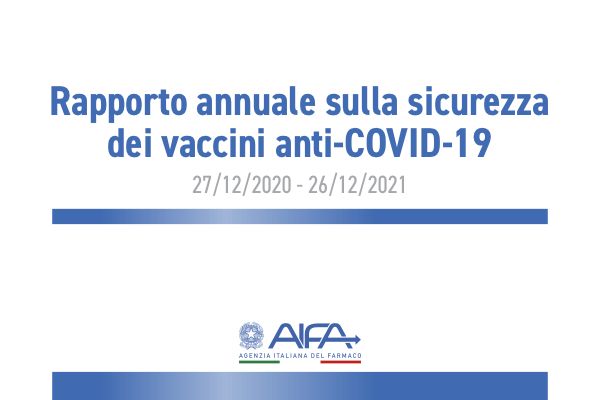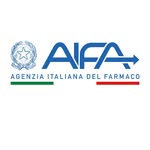.png) Agenzia Italiana del Farmaco
Agenzia Italiana del Farmaco
AIFA publishes annual report on COVID-19 vaccine safety - AIFA publishes annual report on COVID-19 vaccine safety
AIFA publishes annual report on COVID-19 vaccine safety

Press release no. 686 - The Italian Medicines Agency (AIFA) has published the annual report on COVID-19 vaccine safety. The data collected and analysed concern reports of suspected adverse reactions registered in the National Pharmacovigilance Network (RNF) during the vaccination campaign that took place between 27 December 2020 and 26 December 2021, relating to the four vaccines currently used.
In the period considered, 117,920 reports were received out of a total of 108,530,987 administered doses (reporting rate of 109 in every 100,000 doses). Of these, 83.7% (98,717) referred to non-serious events, such as injection site pain, fever, asthenia/fatigue, muscle pain.
Serious reports accounted for 16.2% of the total (19,055), with a reporting rate of 17.6 serious events in every 100,000 administered doses. As previously indicated, regardless of vaccine, dose and type of event, reactions (about 73%) mostly occurred on the day of vaccination or on the following day, and more rarely later than 48 hours following vaccination.
During the vaccination campaign at hand, Comirnaty was the most widely used vaccine in Italy (69.1%), followed by Spikevax (18.3%), Vaxzevria (11.2%) and COVID-19 Vaccine Janssen (1.4%). Reports by vaccine are broken down as follows: Comirnaty 68%, Vaxzevria 19.8%, Spikevax 10.8% and COVID-19 Vaccine Janssen 1.4%.
The most frequently reported adverse events for all vaccines were fever, fatigue, headache, muscle and joint pain, injection site pain, chills and nausea. Such events were mostly non-serious and had resolved at the time of reporting. In the pivotal studies, up to 64% of undesirable effects were detected in the placebo group and related to the so-called nocebo effect.
As regards the administration of the third dose, which started in September 2021, at 26 December 2021, 3,510 reports were registered in the RNF, against 16,198,231 administered third doses, with a reporting rate of 21.7 reports in every 100,000 third doses. This reporting rate is smaller than that observed for the primary course. 84.1% (2,951) of reports referred to non-serious events, with a reporting rate of 18.2 in every 100,000 administered doses. 15.9% (558) referred to serious adverse events, with a reporting rate of 3.4 serious events reported in every 100,000 administered doses.
730 reports were received after heterologous vaccinations, which involved the use of 2 different COVID-19 vaccines for the primary vaccination course (heterologous primary vaccination) or for the booster 3 to 6 months after the primary vaccination course (heterologous booster). Most reports following heterologous vaccination related to the administration of a mRNA vaccine after the first administration of an adenoviral vector vaccine, were mostly non-serious and had the same characteristics as the rest of the reports.
Concerning vaccination in children and adolescents (5-16 years), at 26 December 2021 4,178,361 doses were administered, 96% (4,005,471 doses) of which to people aged 12 to 16 years and 4% to people aged 5 to 11 years (172,890 doses). Of the two vaccines authorised for this population, Comirnaty was the most used (87.5%) (Spikevax 12.5%). At 26 December 2021, a total of 1,170 reports of suspected adverse reactions in the paediatric population were registered in the RNF, representing 1% of all reports. The reporting rate was equal to 28 events in every 100,000 doses administered in the paediatric population, regardless of the type of vaccine and the assessment of the causal link. This rate was lower than in the general population (109 events in every 100,000 administered doses). The most frequently reported adverse events in children and adolescents were fever, headache, fatigue and vomiting. 69% of reactions resolved completely or were improving at the time of reporting. Reporting rates in the 5-11 age group are preliminary and no particular safety concerns have arisen at the moment.
COVID-19 vaccination is indicated both during pregnancy and breast-feeding and no particular safety concerns have emerged from pharmacovigilance data and ad hoc studies in this population. Additionally, there is no evidence suggesting that COVID-19 vaccines may adversely affect fertility in both genders.
Data contained in the Report concerning events of particular interest such as anaphylaxis, Guillain-Barré syndrome, myocarditis/pericarditis, Bell paralysis and thrombocytopenic thrombosis confirm the safety data evaluated at European level.
Published on: 09 February 2022







